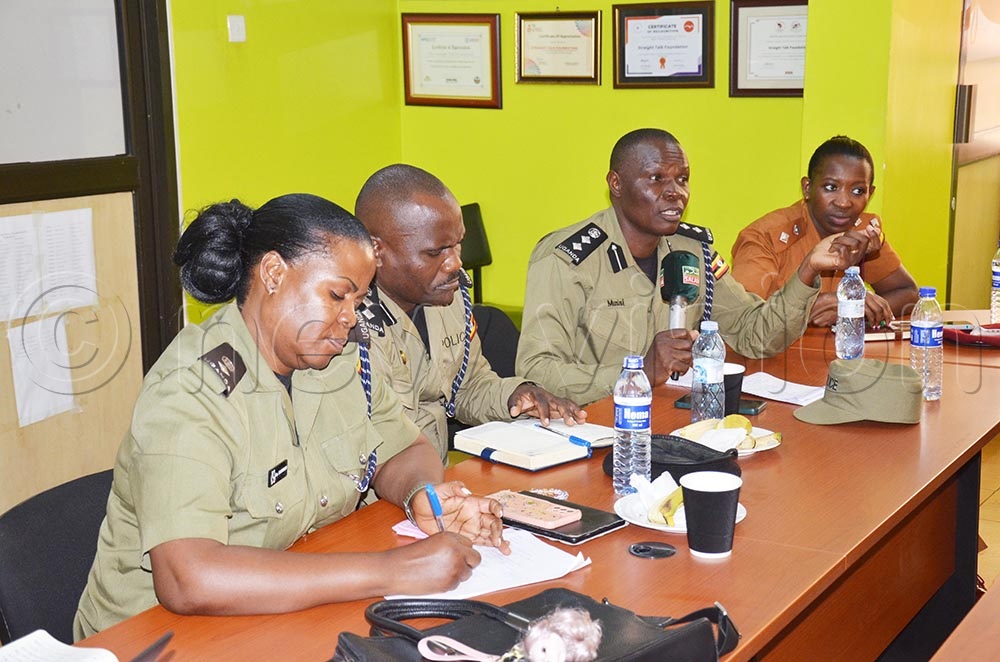Political bloggers, citizen journalists face crackdown over fake news
The Police vowed to crack down on online bloggers and citizen journalists who have been at the centre of spreading fake news to suit particular situations to incite violence.
Officers from various security agencies, prison warders and journalists after the engagement at Straight Talk in Kamwokya, Kampala. (Credit: Isaac Nuwagaba)
By Isaac Nuwagaba
Journalists @New Vision
KAMPALA - In a bid to foster co-operation and ensure a peaceful electoral process, the Uganda Police Force and professional journalists have joined forces to fight the spread of fake news ahead of the 2026 general election.
The Police vowed to crack down on online bloggers and citizen journalists who have been at the centre of spreading fake news to suit particular situations to incite violence.
“Citizen journalists have been sources of hate speech and cyber propaganda running on various online sites in Uganda, which brings more chaos during elections. Opposition political parties have also employed unverified bloggers who distort political reporting in the field, especially during campaigns,” Police political commissar Lameck Kigozi says.
In various incidents, according to Kigozi, these journalists with online blogs have edited stories to suit particular situations without verifying from the traditional sources of news, which he says is dangerous for national security.
Speaking at a study fellowship in peace building, conflict transformation and development workshop sponsored by Rotary Foundation in partnership with Rotary Peace Centre at Makerere University in Kamwokya, Kampala city on Tuesday July 29, 2025, Kigozi challenged media practitioners to be more factual in reporting contentious matters.
“No Police officer receives torture orders to brutalise journalists in the field, but some think that by holding a camera and a recorder, they have every tool to threaten us when doing our work,” he observed.
Dialogue and mutual understanding
In an engagement that brought together Police officers, prison warders, journalists, and civil society actors, they agreed to promote dialogue and build mutual understanding regarding professional conduct ahead of 2026 general elections.
The workshop emphasised the need for independent investigations into crimes against journalists and providing legal redress through impartial oversight bodies with the recent Kawempe North byelection as the benchmark event where the Uganda Peoples’ Defence Forces (UPDF) and other security agencies clashed.
Police officers who included Richard Musisi (speaking), political commissar Lameck Kigozi (second left), and a prison warder during the workshop. (Credit: Isaac Nuwagaba)
“When journalists left their positions in Kawempe North, everyone with a smartphone became a journalist, giving the public unco-ordinated coverage which gave biased information that ended up distorting elections,” Kigozi noted.
Richard Musisi, a Police officer, also decried biased reporting by bloggers and journalists due to their affiliation with certain political parties, which distorts electoral credibility.
Election reporting can be a high-risk endeavour, with journalists often facing challenges such as physical harm, intimidation, or harassment while covering electoral events, Jay Magala, the Rotary fellow said.
“The spread of false information can lead to public mistrust and unrest, making it essential for journalists to prioritise fact-checking and accuracy,” he advised.
Pressure for journalists
Twaha Mukiibi, a show host, said journalists may face pressure to prioritise sensationalism over accuracy or take unnecessary risks to get a story, which can be dangerous to their lives.
“Often, the security agencies have clashed with journalists due to conflicting demands from their media houses or the state itself. Unless the state observes freedom of expression and association, the media is here to suffer,” he said.
“Even in Kawempe, where journalists were properly identified in their protective gears and jackets, many were beaten, arrested and their equipment vandalised," Mukiibi said.
Journalists can hold those in power accountable, while Police can ensure that journalists can do their job without fear of harassment or intimidation, he suggested.
Jamil Ssekajja, a TV journalist, suggested that the state should compel the Uganda Media Council to accredit all journalists and editors by giving out practising certificates like other professions in the country.
“Using Uganda Communications Commission (UCC) alone to intimidate the media houses or even journalists without empowering Uganda Media Council to identify and accredit professional journalists gives much power to media managers to exploit journalists,” Ssekajja suggested.
The rise of bloggers and citizen journalists needs to be dealt with by creating a deliberate system which licenses all journalists in the country to guard against fake news in public, he advised.
By prioritising collaboration, professional training, and independent investigations, they can ensure that the rights of all citizens are protected and that the electoral process is free from violence and intimidation.
